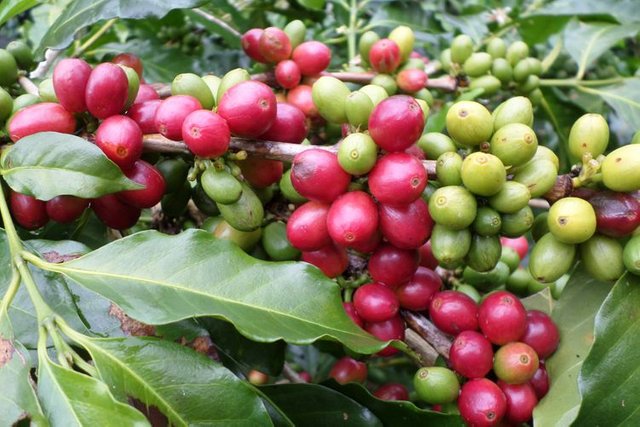Gayo Coffee and Inconsistent Flavor | Aceh indonesia

Indonesia has many types of coffee spread throughout the region. Coffee in every area has a distinctive flavor. One of them is Gayo coffee originating from Aceh.
Gayo Coffee, in addition to famous in its own country, is also known by coffee lovers abroad, especially in the European Union and America.
In Aceh itself, Gayo coffee is mostly grown in the highlands. There are three areas that became the center of Gayo coffee, namely District Takengon, Bener Meriah and Gayo Lues.
The three regions have 60 varieties and cultivated variety of Gayo coffee. However, from many varieties, two of them are taken to be developed, namely varieties Gayo 1 and Gayo 2. Development of these two varieties is a suggestion from the Ministry of Agriculture because both are considered to have good quality ..
"Two varieties are recommended varieties from the Ministry of Agriculture that have been tested from the quality and productivity," said Iwan Juni, a coffee pemehati Aceh origin.
Varieties Gayo 1 and Gayo 2, continued Iwan June, based on taste test. Gayo 1 excels in the enzymatic flavor (perisa) group. While Gayo 2 in the flavor sugar browning group.
Coupled with the viscosity (body) arabica Gayo which is one of the best viscosity in the world, both of these varieties become the favorite of the world coffee buyers.
Ministry of Agriculture, continued Iwan, has released varieties Gayo 1 and Gayo 2 as the leading variety in 2010.
The main features of the Gayo 1 variety are high and sturdy growth, dark green leaf color, light brown pupus, young green colored fruit, bright red colored fruits, slightly elongated fruit shape, slightly blunted tip, ripe fruit less simultaneously, more tolerant to leaf rust disease and the quality of physical and brewing quality is very good.
While the phylogenetic origin of Gayo 1 is not known for certain. However, from the details of plant monology, leaf shape, size of flowers and fruit dompolan with segments (internodia) long allegedly derived from the population of East Timorese arabusta coffee.
Arabusta East Timor is a natural cross between arabica coffee and robusta coffee that occurs in East Timor.
In 1979-1980s, this variety was developed throughout the arabica coffee development area in Indonesia through the Project of Rejuvenation, Rehabilitation and Expansion of Export Crops (PRPTE), including the Gayo Highlands.
Since the breakthrough of the resistance of Catimor Jaluk Variety to leaf rust disease, in the early 2000s, many farmers turned to develop a dense East Timorese varieties and more resistant to leaf rust disease, then use it as a source of seed.
According to Iwan, Gayo 1 comes from the population breeding, which is the selection of a population of East Timorese varieties or known as Hibrido de Timor (HdT). This variety was chosen by two staff from Puslitkoka Jember with incorrect procedures.
However, the error of the procedure is not deliberate. Because, at that time, in the late 1970s, not much information was obtained about new varieties of Gayo coffee.
"As a result commonplace if in the gardens of developers in Gayo land, there is a very high inhomogeneity (not varied), so be selected to Gayo 1 which has better homogeneity,
Meanwhile, the main characteristic of Gayo 2 is a high growth type, widened with sturdy shrubs, dark green leaf, reddish brown shoots, redish somewhat round and pink, moderately resistant to leaf rust, physical quality and steeping quality very good.
Gayo 2 is the result of selection on arabica populations planted mixed with East Timor and Linie 5 in a farmer's garden, Maisir Aman Al in Jongok Meluem Village Bandar District, Bener Meriah Regency.
At this time the remaining 2 of 6 trees from selected trees are planted around the mother tree. The number of 1,500 tree trunks that if identified are selected into 2 types.
"Gayo 2 is a multiline variety originally derived from 4 sticks of coffee in Mr. Maisir's Garden, as with many other multiline varieties, Gayo 2 has excellent homogeneity, because this variety will be recognizable more easily.

One of the hallmarks of Gayo arabica coffee is that it tends to have an inconsistent taste. This happens because coffee plantations in this area have different heights, as well as various ways of cultivation.
"If coffee is cultivated in different areas, with different heights, and varied varieties, then the characteristics of physical quality and taste will also be different," said Mahdi, chairman of the Gayo Cupper Team (GCT), an association of taste testers coffee,
Arabica coffee planted at altitudes below 1,200 mdpl tends to produce ugly physical qualities and tastes that are not preferred by coffee connoisseurs in general. Low coffee acidity and less viscous.
While the coffee is grown above the altitude of 1200 mdpl produce a good coffee beans with a more complex taste.
Mahdi said, the area under the altitude of 1200 mdpl of them in Takengon, namely in District Rusip and Celala, as well as some coffee plantations in District Silihnara.
While the plateau above 1,200 mdpl is in the District Atu Lintang, Jagong Jeget, Bies, and Bebesen, Kute Panang and District Stars.
Meanwhile in Kabupaten Bener Meriah, some of the coffee grown is located in Gajah Putih Subdistrict, Timang Gajah, Bandar, Mesidah, and Main Shiah District. These areas have altitude below 1200 mdpl.
While the area above the altitude of 1200 mdpl in antarnya found in District Bukit, Bandar, Bener Kelipah and District Permata.
"Of course in this case the quality of coffee under 1200 mdpl is not potential to be the area of Gayo arabica coffee cultivation, but suitable for robusta coffee, cocoa, and other commodities," said Mahdi who has 20 years observing the development of Gayo coffee.
Congratulations @zabran! You have completed some achievement on Steemit and have been rewarded with new badge(s) :
Click on any badge to view your own Board of Honor on SteemitBoard.
For more information about SteemitBoard, click here
If you no longer want to receive notifications, reply to this comment with the word
STOP